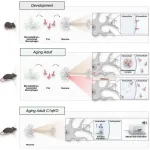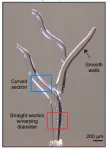(Press-News.org) An “unconventional” immune response now identified by scientists from the Hackensack Meridian Center for Discovery and Innovation (CDI) is a potential new pathway for developing new vaccines for tuberculosis (TB), according to a new publication.
Marginal zone B (MZB) cells are a natural response to TB infection which has been long overlooked - and which might be a welcome new target that could be bolstered through new vaccines to better combat and prevent the disease, according to the new publication in the journal Cell Reports.
“Our results indicate that B cells skew their immune landscape toward MZB cells to execute regulatory functions against TB, emphasizing the importance of antibody-independent mechanisms of B cells for controlling infectious disease, a previously neglected mechanism,” write the authors.
Using high-dimensional flow cytometry, the team mapped the progress of infection in an animal model. They showed that B cells shifted their immune landscape toward the MZB cells.
Through detailed tracking of this shift, the MZB cells showed higher activity and memory-like phenotype expression in response to the infection. In turn, that shaped cytokine patterns and then boosted cell-mediated immunity.
“This discovery opens a new avenue in TB vaccine development, suggesting that targeting B cells for their regulatory functions could be a promising new strategy,” the authors add.
The paper’s authors were led by CDI scientists: Chen-Yu Tsai Ph.D., Ariel Aptekmann, Ph.D. Thomas Dick, Ph.D. and Martin Gengenbacher, Ph.D.
Gengenbacher has studied the Mycobacteria genus of bacteria including tuberculosis for most of his career. In 2021 he was awarded $6.4 million from the NIH to pursue an innovative new TB vaccine concept. Since the only TB vaccine available, Bacille Calmette-Guérin, or BCG, is very unreliable, Gengenbacher and team have proposed to improve BCG by engineering it to stimulate the development and communication of B cells, an important part of the immune system. With this strategy, the researchers are aiming to develop a second-generation TB vaccine that would provide reliable and durable protection from new infections and can even help to cure existing TB infections by complementing antibiotic therapy.
END
CDI scientists ID ‘unconventional’ new pathway for TB vaccines
Marginal zone B (MZB) cells are a natural response to TB infection which has been long overlooked - and which might be a welcome new target
2024-07-15
ELSE PRESS RELEASES FROM THIS DATE:
Mendoza, Weiss receive $2.6 million grant to study biomechanics of lung tumors
2024-07-15
Michelle Mendoza, PhD, researcher at Huntsman Cancer Institute and associate professor of oncological sciences at the University of Utah (the U) and Jeffrey Weiss, PhD, professor of biomedical engineering and faculty member in the Scientific Computing and Imaging Institute at the U, are the recipients of a $2.6 million grant from the National Institutes of Health (NIH) to research how tension in lung tissue affects the growth and distribution of tumors. This innovative approach could uncover new mechanisms for understanding how lung cancer develops.
“There ...
Study shows how narcissistic CEOs influence the board of directors to take more risk
2024-07-15
Narcissistic CEOs that also serve as chair of the board are adept at controlling how their boards of directors focus their attention, giving the CEO the ability to get their way. A new study published in the Strategic Management Journal found that by driving board discussions about risk-taking to hold a positive tone, narcissistic CEOs can allocate more resources toward risk-taking strategies. The findings deepen our understanding of how CEO behavior and personality types can drive risk management strategies.
The research team — Christopher S. Tuggle of the University of Central Arkansas, Cameron J. Borgholthaus of the University of Wyoming, Peter D. Harms of the University of Alabama, ...
Study shows timely transition from pediatric to adult care is critical for young adults with sickle cell disease
2024-07-15
Sickle cell disease is the most common inherited red blood cell disorder in the United States and can lead to health problems including organ dysfunction, acute chest syndrome and strokes over a patient’s lifespan. According to a new study, individuals living with sickle cell disease who experience a delay of more than six months after transferring from pediatric to adult care are twice as likely to be hospitalized compared to those who transition in less than two months.
In the study, Kristen ...
University of Cincinnati study: Long-term stroke survival improving, but racial disparities remain
2024-07-15
Overall rates of long-term survival following stroke are improving, but Black individuals experience worse long-term outcomes compared to white individuals, according to University of Cincinnati research published online July 15 in Neurology®, the medical journal of the American Academy of Neurology.
UC’s David Robinson, MD, corresponding author on the research, said prior studies had examined short-term stroke outcomes of 30 or 60 days, but this time the team looked at survival rates five years past a person’s stroke.
“This was ...
National Institutes of Health grant could mean progress toward improved outcomes for stroke patients
2024-07-15
The Associate Dean of Research at the University of Tennessee Health Science Center’s College of Nursing has received a two-year, $421,188 grant from the National Institutes of Health (NIH) to improve cognitive screening in people who suffer from a devastating type of stroke called aneurysmal subarachnoid hemorrhage (aSAH).
Professor Ansley Stanfill, PhD, RN, FAAN, has devoted her program of research to improving outcomes for people who survive strokes. Her latest grant aims to determine if an existing screening tool can be used in a new way to assess patients following aSAH and trigger a ...
SfN establishes James L. Roberts Endowed Fund
2024-07-15
Washington, D.C. – The Society for Neuroscience (SfN) has received $128,000 from the estate of James L. Roberts, PhD. With the funds, SfN Council voted to create a new long-term endowed fund, The James L. Roberts Fund, and will use the income from its investments to create and perpetually fund James L. Roberts Trainee Professional Development Awards (TPDAs) beginning at Neuroscience 2024.
“I knew Jimmy Roberts very well. We basically launched neurobiology at Sinai when we co-directed the Fishberg Research Center for Neurobiology at Mount Sinai from 1989–2002,” said incoming SfN President John Morrison. “Jimmy was an outstanding ...
Unlocking the mystery of preexisting drug resistance: New study sheds light on cancer evolution
2024-07-15
CLEVELAND—The evolution of resistance to diseases, from infectious illnesses to cancers, poses a formidable challenge.
Despite the expectation that resistance-conferring mutations would dwindle in the absence of treatment due to a reduced growth rate, preexisting resistance is pervasive across diseases that evolve—like cancer and pathogens—defying conventional wisdom.
In cancer, it is well known that small numbers of drug-resistant cells likely exist in tumors even before they’re treated. In something of a paradox, before treatment, these mutants have been repeatedly shown to have lower fitness than the surrounding ancestor cells from which they arose. It leads ...
New study reveals critical role of C1q protein in neuronal function and aging
2024-07-15
BOSTON, Mass. (July 15, 2024)—A groundbreaking study conducted at the lab of Beth Stevens, PhD, at Boston Children’s Hospital has revealed that an immune protein impacts neuronal protein synthesis in the aging brain. Previous work from the Stevens lab had uncovered that immune cells in the central nervous system, microglia, help prune synapses in the developing brain by tagging synapses with the immune protein C1q. New research led by Nicole Scott-Hewitt, published in Cell, shows that neurons can also internalize C1q. C1q seems to influence protein production inside neurons by interacting with ribosomal proteins, RNA-binding proteins, and ...
New research demonstrates potential for increasing effectiveness of popular diabetes, weight-loss drugs
2024-07-15
A network of proteins found in the central nervous system could be harnessed to increase the effectiveness and reduce the side effects of popular diabetes and weight-loss drugs, according to new research from the University of Michigan.
The study, appearing today in the Journal of Clinical Investigation, focused on two proteins called melanocortin 3 and melanocortin 4 found primarily on the surface of neurons in the brain that play a central role in regulating feeding behavior and maintaining the body's energy balance.
Melanocortin ...
Understanding the 3D ice-printing process to create micro-scale structures
2024-07-15
Advances in 3D printing have enabled many applications across a variety of disciplines, including medicine, manufacturing, and energy. A range of different materials can be used to print both simple foundations and fine details, allowing for the creation of structures with tailored geometries.
However, creating structures with micro-scale, precise internal voids and channels still poses challenges. Scaffolds used in tissue engineering, for example, must contain a three-dimensional complex network of conduits that mimic the human vasculature. With traditional additive manufacturing, where the material is deposited layer ...
LAST 30 PRESS RELEASES:
Ketamine high NOT related to treatment success for people with alcohol problems, study finds
1 in 6 Medicare beneficiaries depend on telehealth for key medical care
Maps can encourage home radon testing in the right settings
Exploring the link between hearing loss and cognitive decline
Machine learning tool can predict serious transplant complications months earlier
Prevalence of over-the-counter and prescription medication use in the US
US child mental health care need, unmet needs, and difficulty accessing services
Incidental rotator cuff abnormalities on magnetic resonance imaging
Sensing local fibers in pancreatic tumors, cancer cells ‘choose’ to either grow or tolerate treatment
Barriers to mental health care leave many children behind, new data cautions
Cancer and inflammation: immunologic interplay, translational advances, and clinical strategies
Bioactive polyphenolic compounds and in vitro anti-degenerative property-based pharmacological propensities of some promising germplasms of Amaranthus hypochondriacus L.
AI-powered companionship: PolyU interfaculty scholar harnesses music and empathetic speech in robots to combat loneliness
Antarctica sits above Earth’s strongest “gravity hole.” Now we know how it got that way
Haircare products made with botanicals protects strands, adds shine
Enhanced pulmonary nodule detection and classification using artificial intelligence on LIDC-IDRI data
Using NBA, study finds that pay differences among top performers can erode cooperation
Korea University, Stanford University, and IESGA launch Water Sustainability Index to combat ESG greenwashing
Molecular glue discovery: large scale instead of lucky strike
Insulin resistance predictor highlights cancer connection
Explaining next-generation solar cells
Slippery ions create a smoother path to blue energy
Magnetic resonance imaging opens the door to better treatments for underdiagnosed atypical Parkinsonisms
National poll finds gaps in community preparedness for teen cardiac emergencies
One strategy to block both drug-resistant bacteria and influenza: new broad-spectrum infection prevention approach validated
Survey: 3 in 4 skip physical therapy homework, stunting progress
College students who spend hours on social media are more likely to be lonely – national US study
Evidence behind intermittent fasting for weight loss fails to match hype
How AI tools like DeepSeek are transforming emotional and mental health care of Chinese youth
Study finds link between sugary drinks and anxiety in young people
[Press-News.org] CDI scientists ID ‘unconventional’ new pathway for TB vaccinesMarginal zone B (MZB) cells are a natural response to TB infection which has been long overlooked - and which might be a welcome new target






